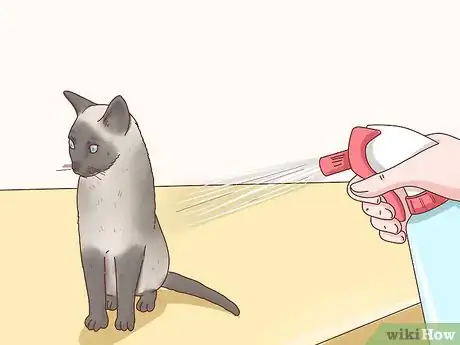This article was co-authored by Pippa Elliott, MRCVS. Dr. Elliott, BVMS, MRCVS is a veterinarian with over 30 years of experience in veterinary surgery and companion animal practice. She graduated from the University of Glasgow in 1987 with a degree in veterinary medicine and surgery. She has worked at the same animal clinic in her hometown for over 20 years.
wikiHow marks an article as reader-approved once it receives enough positive feedback. This article received 18 testimonials and 88% of readers who voted found it helpful, earning it our reader-approved status.
This article has been viewed 464,010 times.
The Siamese cat is a rare and unique breed which has survived for more than 10 centuries. In Thailand, they were sacred and used to be guardians of the temple.[1] Many people dream of owning a Siamese cat because of their enchanting eyes, striking looks, and elegance. They are also a highly intelligent breed who don't like to be ignored and have a reputation for being both very vocal and demanding. Before you decide to get a Siamese, take the time to learn more about the breed and consider whether or not it is the right type of pet for you.
Steps
Traits
-
1Learn about the positive traits of Siamese Cats. There are many good reasons to own a Siamese cat. Learn about all of the great things that this breed has to offer as you consider whether or not a Siamese is right for you.
- Siamese cats are known to be very affectionate cats. They love to sit on your lap and will even climb into bed with you at night.[2]
- Siamese cats are very beautiful. They come in many different color variations and they have beautiful blue eyes. The most common colors are seal, chocolate, blue, and lilac point.[3]
- They don't require much grooming. Their hair is very short, and while they do shed it's not as noticeable as with some breeds.
- They are energetic and love to play.
- They are often good with children. They may even be more tolerant of young people than they are of adults. Of course, you should always supervise young children with pets to ensure the safety of both the child and the pet.[4]
-
2Consider a Siamese if you would like a dog but cannot have one. If you would like to own a dog but cannot walk one or you are not allowed to have one where you live, then you may want to consider a Siamese. They share many of the same attributes of a dog and some Siamese cats can even be taught how to play fetch.[5]
- Make sure that you are allowed to have a cat where you live. If you rent, check with your landlord to be certain.
Advertisement -
3Be aware of the health problems associated with Siamese cats. Most purebred animals come with an increased risk of certain health problems because of the selective breeding necessary to create the breed. The Siamese cat is no different. Some of the conditions that Siamese cats are susceptible to include:
- Early onset kidney disease. A variety of problems affect the kidney leading the cat to age prematurely. This condition may cause increased thirst, poor appetite, weight loss, vomiting, bad breath, poor coat, and early death. In some cases the deterioration can be slowed with prescription diets and medications but regular visits to the vet will be necessary.[6]
- Weakness in the immune system. This condition makes the cat vulnerable to acquiring the feline leukemia infection. If you have a cat that is leukaemia positive, then getting a Siamese is not a good idea.
- Megaesophagus. The esophagus is the muscular tube connecting the mouth to the stomach. If the cat develops megaesophagus, the tube will become big and saggy, which delays food on its journey down into the stomach. This condition leads to regurgitation of food, inadequate calorie intake, and malnourishment.
- Eye twitching. Siamese cats may also have a quirk in the nerve supply to the eyes, which means their eyes track constantly from side to side as if watching a never ending train passing by.[7]
Breed Info
-
1Understand that Siamese cats differ from other cat breeds. While many cats are placid, easygoing, and like to sleep a lot, a Siamese is not this type of cat. In certain ways, having a Siamese is much more like owning a dog. Siamese cats are strong-willed and intelligent. If the Siamese sets its sights on doing something then they will do it regardless of the obstacles or consequences.[8]
-
2Expect difficulty training your Siamese cat. Because of their intelligence and stubbornness, Siamese cats are very difficult to train. For example, a Siamese may ignore unpleasant experiences such as being squirted with water, which makes it difficult to deter them from bad behavior.
-
3Be aware that Siamese cats are extremely vocal. A regular cat may chirp and purr sometimes, but the Siamese yowls and howls. A Siamese may keep howling and yowling for hours if it wants something. The Siamese cat’s howl is loud and quite annoying, which is what makes it so difficult to ignore[9]
- Think about whether a noisy cat would annoy you or comfort you.
-
4Keep in mind that Siamese cats crave company. If you want a cat because you are out a lot, then getting a Siamese cat may not be your best option. Siamese cats need attention and they will howl or destroy the place if they don't get it. These cats are needy and they demand your attention. If they don't get enough attention, they often resort to destructive behavior to take their minds off being alone.[10]
- You will need to board your Siamese cat or hire a live-in pet sitter when you'll be away for more than one day, as your Siamese won't be able to tolerate human absence for any lengthy period.
-
5Decide if you can make your home safe enough for a new cat or kitten. If you plan to get a Siamese kitten, then you will need to kitten proof your home. But even if you plan to get an adult Siamese, you will need to make sure that your home is safe for the cat. Siamese cats are very intelligent and curious. They may end up tangled in your electrical wires or climbing up into your shelves.
- Secure loose wires, put a screen on the fireplace, put child safety locks on all of your shelves, and keep fire out of reach.
Finding a Siamese Cat
-
1Adopt a Siamese from a Siamese rescue group or from a shelter. Keep in mind that Siamese from shelters may not be pedigreed, even if they look like Siamese cats. The only way to know for sure if a cat is Siamese is to read the cat's registration papers, which most shelter cats don't have. However, a cat from a shelter can make a wonderful companion.[11]
- Rescue groups may have papers for their Siamese cats, depending on how the cats were obtained.
-
2Buy a Siamese from a responsible breeder. If you want to be sure that you are getting a Siamese cat, do not get a Siamese cat from a backyard breeder or a pet store. Do your research first. Responsible breeders will be glad to give you references and tell you which cat associations they belong to. They will also provide registration papers and a health guarantee.[12]
- Cat shows are excellent places to meet responsible breeders.
-
3Ask your veterinarian for recommendations. If you do not know any breeders in your area and you cannot find a Siamese in a shelter, consider asking your local veterinarian for recommendations on how to find a Siamese cat. Your veterinarian may be able to refer you to a reputable breeder or Siamese rescue group in your area.
Expert Q&A
Did you know you can get expert answers for this article?
Unlock expert answers by supporting wikiHow
-
QuestionAre Siamese cats very vocal?
 Pippa Elliott, MRCVSDr. Elliott, BVMS, MRCVS is a veterinarian with over 30 years of experience in veterinary surgery and companion animal practice. She graduated from the University of Glasgow in 1987 with a degree in veterinary medicine and surgery. She has worked at the same animal clinic in her hometown for over 20 years.
Pippa Elliott, MRCVSDr. Elliott, BVMS, MRCVS is a veterinarian with over 30 years of experience in veterinary surgery and companion animal practice. She graduated from the University of Glasgow in 1987 with a degree in veterinary medicine and surgery. She has worked at the same animal clinic in her hometown for over 20 years.
Veterinarian
-
QuestionDo Siamese get along with other breeds of cat?
 Pippa Elliott, MRCVSDr. Elliott, BVMS, MRCVS is a veterinarian with over 30 years of experience in veterinary surgery and companion animal practice. She graduated from the University of Glasgow in 1987 with a degree in veterinary medicine and surgery. She has worked at the same animal clinic in her hometown for over 20 years.
Pippa Elliott, MRCVSDr. Elliott, BVMS, MRCVS is a veterinarian with over 30 years of experience in veterinary surgery and companion animal practice. She graduated from the University of Glasgow in 1987 with a degree in veterinary medicine and surgery. She has worked at the same animal clinic in her hometown for over 20 years.
Veterinarian Yes, although, as with any breed, introducing a new cat to an established cat needs to be done slowly and carefully. Siamese are outgoing and playful, and they generally enjoy having another cat (of any breed) to play with.Make sure each cat has her own food and water bowls, toys, bed, and litter tray. Keep the new cat in a separate room, and introduce them by scent first, stroking first one cat and then the other.
Yes, although, as with any breed, introducing a new cat to an established cat needs to be done slowly and carefully. Siamese are outgoing and playful, and they generally enjoy having another cat (of any breed) to play with.Make sure each cat has her own food and water bowls, toys, bed, and litter tray. Keep the new cat in a separate room, and introduce them by scent first, stroking first one cat and then the other. -
QuestionHow will a Siamese cat cope when left at someone else's house?
 Pippa Elliott, MRCVSDr. Elliott, BVMS, MRCVS is a veterinarian with over 30 years of experience in veterinary surgery and companion animal practice. She graduated from the University of Glasgow in 1987 with a degree in veterinary medicine and surgery. She has worked at the same animal clinic in her hometown for over 20 years.
Pippa Elliott, MRCVSDr. Elliott, BVMS, MRCVS is a veterinarian with over 30 years of experience in veterinary surgery and companion animal practice. She graduated from the University of Glasgow in 1987 with a degree in veterinary medicine and surgery. She has worked at the same animal clinic in her hometown for over 20 years.
Veterinarian The Siamese cat will be fine, but the same can't be said for the house! Siamese are intelligent, outgoing, and playful. They will regard visiting another house as an opportunity to play, explore, and quite possibly get into trouble. It's best to make sure the home owner is a cat lover and comfortable with the havoc that an active Siamese may cause.
The Siamese cat will be fine, but the same can't be said for the house! Siamese are intelligent, outgoing, and playful. They will regard visiting another house as an opportunity to play, explore, and quite possibly get into trouble. It's best to make sure the home owner is a cat lover and comfortable with the havoc that an active Siamese may cause.
Warnings
- Having a pet costs money. Do not get a pet unless you can afford its food, veterinary care, and other basic needs.⧼thumbs_response⧽
- Getting a pet is a long-term commitment. Do not get any kind of pet unless you are willing and able to care for it for its entire life. For cats, this can mean 10-20 years!⧼thumbs_response⧽
References
- ↑ http://www.petmd.com/cat/breeds/c_ct_siamese
- ↑ http://cattime.com/cat-breeds/siamese-cats
- ↑ http://www.petmd.com/cat/breeds/c_ct_siamese
- ↑ http://cattime.com/cat-breeds/siamese-cats
- ↑ http://cattime.com/cat-breeds/siamese-cats
- ↑ Nelson, R, and Couto, G, (2014), Small Animal Internal Medicine, ISBN 978-0323086820
- ↑ Nelson, R, and Couto, G, (2014), Small Animal Internal Medicine, ISBN 978-0323086820
- ↑ http://www.petmd.com/cat/breeds/c_ct_siamese
- ↑ http://www.petmd.com/cat/breeds/c_ct_siamese
About This Article
To decide if a Siamese cat is right for you, start by considering whether you’re up for a pet that’s active and energetic, since Siamese are different from most cats in this way. Additionally, think about whether your lifestyle is suitable for a pet that demands a lot of attention and affection. You should also make sure you can tolerate a noisy environment, as Siamese tend to yowl and howl rather than purr or chirp. Be aware that Siamese are also prone to health problems such as early onset kidney disease, which you should research before getting a Siamese cat. For more information from our Veterinary co-author, including how to find a Siamese through a breeder or at your local shelter, read on!










































































